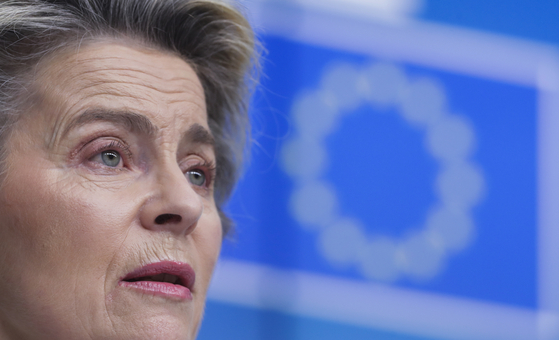In the event of an emergency in the procurement of the COVID-19 vaccine, the European Union (EU) announced that it would control the export of vaccines produced in member countries. This is because pharmaceutical companies unilaterally try to delay the vaccine supply schedule without sufficient explanation.
Pharmaceutical companies delayed vaccine supply schedule
“I’ll check if the contract is fulfilled”
![Ursula von der Ryan, head of the EU Commission. [AP=연합뉴스]](https://i0.wp.com/pds.joins.com/news/component/htmlphoto_mmdata/202101/26/4a4f012d-c895-4113-ab1a-dcc3d1a42784.jpg?w=560&ssl=1)
Ursula von der Ryan, head of the EU Commission. [AP=연합뉴스]
According to the UK Daily Guardian on the 25th (local time), the EU Commission contacted AstraZeneca, a multinational pharmaceutical company, to discuss the issue of vaccine supply to 27 member countries scheduled for mid-month next.
In a phone call with CEO Pascal Sorio AstraZeneca, EU Executive Chairman Ursula von Deerlion pointed out, “There is no reason for the vaccine supply schedule to be delayed.” He reminds us that the EU has already made significant investments to expand vaccine production. “To avoid delays in supply,” he said, “use all possible flexibility to find a solution.”
![EU Health Commissioner Stella Kyriachides said that pharmaceutical companies have proposed a ``transparency system'' to member states that notify them before exporting the COVID-19 vaccine to non-member states. [EPA=연합뉴스]](https://i0.wp.com/pds.joins.com/news/component/htmlphoto_mmdata/202101/26/80302f12-af1c-43d8-880a-8ef5b0d7d0a8.jpg?w=560&ssl=1)
EU Health Commissioner Stella Kyriachides said that pharmaceutical companies have proposed a “transparency system” to member states that notify them before exporting the COVID-19 vaccine to non-member states. [EPA=연합뉴스]
Earlier, the EU Health Commissioner Stella Kyriachides also met with AstraZeneca officials. It issued an official statement stating that the delay in vaccine supply is unacceptable. Commissioner Kyriachides said, “AstraZeneca’s response was neither clear nor sufficient,” and requested transparent information sharing on the vaccine production situation and export process.
therefore It announced that it has proposed to the member countries the’Export Transparency Principle’, which requires pharmaceutical companies to be notified in advance when they export vaccines to non-EU member countries. In this regard, German Minister of Health Jensspan said, “We have the right to make sure that the contract is being implemented fairly,” and said, “The export transparency principle is a reasonable demand.”
![A Corona 19 bag jointly developed by AstraZeneca with Oxford University in the UK.[아스트라제네카]](https://i0.wp.com/pds.joins.com/news/component/htmlphoto_mmdata/202101/26/a87fa3f4-5bd9-4cac-9608-511a3d5008ee.jpg?w=560&ssl=1)
A Corona 19 bag jointly developed by AstraZeneca with Oxford University in the UK.[아스트라제네카]
This discussion It came after AstraZeneca announced on the 22nd that the initial volume of vaccines to be supplied to the EU would be less than expected.
Initially, AstraZeneca’s first quarter supply promised was 80 million batches. However, due to the problem of the Belgian supplier in charge of supplying the vaccine, it is expected to be able to provide only 31 million doses, which is 39% of the expected supply. The AstraZeneca vaccine is currently under review for conditional marketing approval by the European Medicines Agency (EMA), with results coming out on the 29th.
Pfizer-Bioentech, which had previously signed a contract with the EU to supply 600 million doses, has also announced a delay in vaccine supply. Pfizer said it would reduce vaccine shipments over the next few weeks with the construction of a production facility in Belgium.

US President Joe Biden said on the 21st (local time) that prior to signing an executive order on the response to Corona 19, “Everyone visiting the United States must undergo corona testing before flying and will have to quarantine after entering the country.” [로이터=연합뉴스]
Given this situation, EU member states are complaining that the initial supply of vaccines is less than expected. Some countries, such as Italy, Poland, and Austria, have also announced legal actions against pharmaceutical companies, claiming that it is a violation of the contract.
The situation is similar in the United States, which is experiencing a shortage of vaccines. However, there is an expectation that the speed of vaccination will accelerate with the launch of the Joe Biden government. According to the New York Times President Biden said at a press conference that day, “Maybe the vaccination target can be raised from 1 million to 1.5 million a day within three weeks.” To this end, it also suggested specific alternatives, saying that it is adjusting the schedule to increase vaccination workforce, expand vaccine production, and increase vaccination sites. Although securing vaccine supplies will be a greater challenge than anything else, he said, “I think I can do it,” and expressed confidence that he will step closer to collective immunity in the summer.
Reporter Lee Min-jung [email protected]
